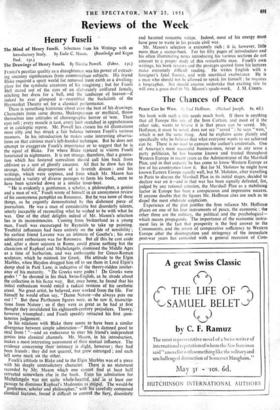Reviews of the Week
Henry Fuseli
The Mind of Henry Fuseli. Selections Irom his Writings with an Introductory Study. By Eudo C. Mason. (Routledge and Regan Paul. 25$.) The Drawings of Henry Fuseli. By Nicolas Powell. (Faber. 25s.)
FUSELI'S peculiar quality as a draughtsman was his power of extract- ing uncanny significances from commonplace subjects. His friend Blake required a spirit world far removed from earth as a dwelling- place for the symbolic creatures of his imagining ; but for Fuseli Hell stared out of the eyes of an elaborately coiffured female, stitching her dress for a ball, and the landscape of heaven—if indeed he ever glimpsed it—resembled the backcloth of the Haymarket Theatre set for a classical performance. There is something histrionic about even the best of his drawings. Characters from some drama, Shakespearean or mythical, throw themselves into attitudes of choreographic horror or 'woe. Their eyes roll ; every muscle is taut, every limb stretched in apprehension or in cataleptic repose. Mr. Powell has chosen his 64 illustrations most ably and has struck a fair balance between Fuseli's various manners. In his introduction he makes some interesting observa- tions on that curious man's left-handed technique. But he does not attempt to exaggerate Fuseli's importance or to suggest that he is the equal of Blake. For where Blake rejoiced in visions Fuseli luxuriated in nightmares. It is not strange, therefore, that a genera- tion which has fostered surrealism should call him back from oblivion as a sort of ghostly ancestor. All that he drew has the strange, baleful disproportions of a feverish dream • and his writings, which were copious, and from which Mr. Mason has extracted a variety of diverse passages to form his book, seem to have been scrawled down at a similar fever-heat.
"He is evidently a gentleman, a scholar, a philosopher, a genius and a man of wit," Fuseli wrote of himself in an anonymous review of his anonymous pamphlet on Rousseau. But he was none of these things, as he cogently demonstrated by this dishonest piece of journalism. He was a man of considerable but disorderly talents, utterly incapable of reconciling what he wished to be with what he was. One of the chief delights indeed of Mr. Mason's selection lies in its inconsistencies. Coming from Switzerland as a young man, Fuseli was encouraged by Reynolds to take up painting. Youthful influences had been entirely on the side of sensibility ; his earliest friend Lavater was an intimate of Goethe's ; his own adolescent enthusiasm was for Rousseau. But all this he cast aside and, after a short sojourn in Rome, could praise nothing but the classicism of Raphael and Michelangelo. dismissed the Middle Ages as a time of barbarism, and was enthusiastic for Greco-Roman sculpture, which he mistook for Greek. His attitude to the Elgin Marbles, when Haydon dragged him off to see them in Lord Elgin's damp shed in Park Lane, is indicative of the theory-ridden intoler- ance of his maturity. "Dc Greeks were godes ! De Greeks were godes ! " he shouted in his thick Swiss-English, as he strode about the collection in his fitrce way. But, once home, he found that his initial enthusiasm would entail a radical revision of his aesthetic creed. No great artist, he believed, ever worked from the life. For himself he .would often say, "Damn Nature—she always puts me out I " But these Parthenon figures were, as he saw it, transcrip- tions from Nature ; so if they were as great as he had at first thought they invalidated his eighteenth-century prejudices. Theory; however, triumphed ; and Fuseli speedily retracted his first ;non- taneous judgement.
In his relations with Blake there seems to have been a similar divergence between simple admiration—" Blake is damned good to steal from ! "—and an endeavour to steer his friend's independent genius into classical channels. Mr. Mason, in his introduction, makes a most interesting assessment of their mutual influence. The evidence concerning their' intimacy is slight, however ; they had been friends ; they did not quarrel, but grew estranged ; and each left some mark on the other.
Fuseli's attitude to Blake and to the Elgin Marbles was of a piece with his deeply contradictory character. There is no statement recorded by Mr. Mason which one cannot find at least half retracted somewhere else in the book. Even his admiration for Michelangelo was not quite whole-hearted, and in at least one passage he dismisses Raphael's Madonnas as insipid. The would-be " gentleman, scholar and philosopher," with his carefully composed classical features, found it difficult to contrdll the fiery, disorderly
and haunted romantic within. Indeed, most of his energy must have gone to waste in his private civil war.
Mr. Mason's selection is extremely rich ; it is, however, little more than a source-book. For his fifty pages of introduction and his often illuminating notes introducing his various sections do not amount to a proper study of this remarkable man. Fuseli's own writings, his book reviews and the passages quoted from his lectures make extremely difficult reading. He writes English with a foreigner's fatal fluency, and with uncritical exuberance He is a man who should not be allowed to speak for himself: he requires a biographer. But should anyone undertake that exciting role he will owe a great deal to Mr. Mason's spade-work. J. M. COHEN.


































 Previous page
Previous page